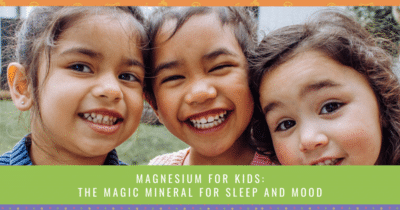Parents often focus on their child’s diet, ensuring they get enough protein , calcium and vitamins but there is one quiet, behind-the-scenes nutrient that is equally vital and too often overlooked. That nutrient is magnesium , the mineral that acts as a brain ’s “bodyguard,” regulating emotions, supporting learning and protecting young neurons from overload.
Studies show magnesium’s involvement in improving synaptic facilitation, memory and learning while clinical cases have documented that magnesium supplementation in children with developmental delays or ADHD symptoms brought significant behavioural improvements. Additionally, antenatal magnesium sulfate treatment has been associated with enhanced brain maturation and protection against neurological disorders like cerebral palsy in preterm infants.
According to a 2024 review in Nutrients, clinical data confirmed magnesium's essential role in energy metabolism, muscle function and immune support in growing children, emphasizing deficiency risks including cognitive and behavioural disorders. Research published in JAMA Network Open in 2024 demonstrated that prenatal magnesium sulfate administration was associated with improved functional connectivity in newborns' brains, suggesting long-term benefits for neurodevelopment.

A 2019 study published in Developmental Medicine & Child Neurology, highlighted the neuroprotective effects of antenatal magnesium sulfate in preterm infants, reducing the risk of cerebral palsy and improving brain maturation assessed by MRI biomarkers. As per a 2010 study in the Journal of Neural Transmission, magnesium supplementation improved synaptic plasticity and reduced symptoms in children with attention deficit hyperactivity disorder (ADHD). The study concluded that magnesium plays a critical role in neuronal function and cognitive behaviour regulation.
Yet, in a world of processed foods and fast-paced routines, many children are unknowingly falling short and the effects can quietly ripple through their focus, mood and even sleep.
Mistake #1: Thinking magnesium is just another mineral
In an interview with the Times of India, Dr Himani Narula Khanna, Developmental Behavioral Pediatrician and Co-founder of Continua Kids , shared, “Magnesium isn’t just important — it’s essential for nearly every function in a child’s brain and body.”
She explained that magnesium helps build and protect brain cells, assists neuron communication and regulates the brain’s signalling system. In simpler terms, it’s what keeps the brain calm, connected and focused.
Low magnesium levels can throw that system off balance. “Children with ADHD often have low magnesium levels,” Dr. Khanna noted. “That deficiency can lead to irritability, hyperactivity, or lack of focus.” In other words, before assuming your child needs more discipline or less screen time, it might be worth looking at what’s on their plate.
Mistake #2: Ignoring the signs of deficiency
Children low in magnesium often show subtle symptoms that parents might not immediately connect to diet.
According to Dr Ravi Malik, Founder and Medical Director of Malik Radix Healthcare, “A magnesium-deficient child might appear restless, anxious, or struggle with concentration and sleep. They may also experience fatigue, muscle cramps, or even frequent allergies.”

He emphasised that this is because magnesium plays a role not just in the brain but also in muscle health, energy production and immunity. The expert pointed that around 60% of the body’s magnesium is stored in the bones, making it equally critical for skeletal strength and calcium balance.
Mistake #3: Not pairing diet and lifestyle
The good news is that magnesium is not rare, it is hiding in everyday foods we often skip. “Leafy greens, nuts, seeds, beans, lentils, oats, brown rice, bananas, avocados, and even a small square of dark chocolate can help,” Dr Khanna said. Dr. Malik added that a well-rounded diet with whole grains, pulses and dairy provides a steady magnesium boost that supports mental clarity and physical stamina but here’s the catch: kids who are fussy eaters, constantly stressed or recovering from illness may deplete magnesium faster than they can replenish it. That is why paediatricians recommend reviewing dietary habits before jumping to supplements and if supplements are needed, doing so under medical supervision.
Mistake #4: Overlooking the emotional connection
We often talk about “balanced diets” but rarely about balanced moods and magnesium affects both. Dr Khanna explained, “Magnesium helps regulate the brain’s response to stress and keeps children from feeling overloaded.” It is a biochemical calm button that protects developing brains from the toxic effects of constant overstimulation. Enough magnesium can mean fewer meltdowns, better focus, and improved sleep. This is why paediatricians sometimes call it “nature’s chill pill”, a mineral that doesn’t sedate but stabilises.
Mistake #5: Treating supplements as a one-size-fits-all fixIt can be tempting to grab a bottle of magnesium gummies off the shelf but experts caution against self-prescribing.
“Every child’s needs are unique,” said Dr Khanna. “Before introducing supplements, parents should consult their healthcare provider.” This is especially important for children already on medication or those with underlying conditions like ADHD or anxiety, where nutrient interactions can influence outcomes.
Bottom line
In the grand story of growth and development , magnesium rarely takes center stage yet it is the quiet force that keeps the show running smoothly. From memory and learning to emotional balance and immunity, it supports the very systems that help children thrive. So the next time you plan your child’s meals, think beyond the basics.
Add that handful of almonds, the side of spinach or that comforting banana smoothie. It is not just a food, it is fuel for focus, calm and creativity because when it comes to your child’s brain, skipping magnesium is not a small mistake; it is a missed opportunity for lifelong resilience.
Note: The information provided in this article is for educational purposes only and is not intended as medical advice. Always consult with a healthcare professional before starting any new medication or treatment.
Studies show magnesium’s involvement in improving synaptic facilitation, memory and learning while clinical cases have documented that magnesium supplementation in children with developmental delays or ADHD symptoms brought significant behavioural improvements. Additionally, antenatal magnesium sulfate treatment has been associated with enhanced brain maturation and protection against neurological disorders like cerebral palsy in preterm infants.
According to a 2024 review in Nutrients, clinical data confirmed magnesium's essential role in energy metabolism, muscle function and immune support in growing children, emphasizing deficiency risks including cognitive and behavioural disorders. Research published in JAMA Network Open in 2024 demonstrated that prenatal magnesium sulfate administration was associated with improved functional connectivity in newborns' brains, suggesting long-term benefits for neurodevelopment.

A 2019 study published in Developmental Medicine & Child Neurology, highlighted the neuroprotective effects of antenatal magnesium sulfate in preterm infants, reducing the risk of cerebral palsy and improving brain maturation assessed by MRI biomarkers. As per a 2010 study in the Journal of Neural Transmission, magnesium supplementation improved synaptic plasticity and reduced symptoms in children with attention deficit hyperactivity disorder (ADHD). The study concluded that magnesium plays a critical role in neuronal function and cognitive behaviour regulation.
Yet, in a world of processed foods and fast-paced routines, many children are unknowingly falling short and the effects can quietly ripple through their focus, mood and even sleep.
Mistake #1: Thinking magnesium is just another mineral
In an interview with the Times of India, Dr Himani Narula Khanna, Developmental Behavioral Pediatrician and Co-founder of Continua Kids , shared, “Magnesium isn’t just important — it’s essential for nearly every function in a child’s brain and body.”
She explained that magnesium helps build and protect brain cells, assists neuron communication and regulates the brain’s signalling system. In simpler terms, it’s what keeps the brain calm, connected and focused.
Low magnesium levels can throw that system off balance. “Children with ADHD often have low magnesium levels,” Dr. Khanna noted. “That deficiency can lead to irritability, hyperactivity, or lack of focus.” In other words, before assuming your child needs more discipline or less screen time, it might be worth looking at what’s on their plate.
Mistake #2: Ignoring the signs of deficiency
Children low in magnesium often show subtle symptoms that parents might not immediately connect to diet.
According to Dr Ravi Malik, Founder and Medical Director of Malik Radix Healthcare, “A magnesium-deficient child might appear restless, anxious, or struggle with concentration and sleep. They may also experience fatigue, muscle cramps, or even frequent allergies.”
He emphasised that this is because magnesium plays a role not just in the brain but also in muscle health, energy production and immunity. The expert pointed that around 60% of the body’s magnesium is stored in the bones, making it equally critical for skeletal strength and calcium balance.
Mistake #3: Not pairing diet and lifestyle
The good news is that magnesium is not rare, it is hiding in everyday foods we often skip. “Leafy greens, nuts, seeds, beans, lentils, oats, brown rice, bananas, avocados, and even a small square of dark chocolate can help,” Dr Khanna said. Dr. Malik added that a well-rounded diet with whole grains, pulses and dairy provides a steady magnesium boost that supports mental clarity and physical stamina but here’s the catch: kids who are fussy eaters, constantly stressed or recovering from illness may deplete magnesium faster than they can replenish it. That is why paediatricians recommend reviewing dietary habits before jumping to supplements and if supplements are needed, doing so under medical supervision.
Mistake #4: Overlooking the emotional connection
We often talk about “balanced diets” but rarely about balanced moods and magnesium affects both. Dr Khanna explained, “Magnesium helps regulate the brain’s response to stress and keeps children from feeling overloaded.” It is a biochemical calm button that protects developing brains from the toxic effects of constant overstimulation. Enough magnesium can mean fewer meltdowns, better focus, and improved sleep. This is why paediatricians sometimes call it “nature’s chill pill”, a mineral that doesn’t sedate but stabilises.
Mistake #5: Treating supplements as a one-size-fits-all fixIt can be tempting to grab a bottle of magnesium gummies off the shelf but experts caution against self-prescribing.
“Every child’s needs are unique,” said Dr Khanna. “Before introducing supplements, parents should consult their healthcare provider.” This is especially important for children already on medication or those with underlying conditions like ADHD or anxiety, where nutrient interactions can influence outcomes.
Bottom line
In the grand story of growth and development , magnesium rarely takes center stage yet it is the quiet force that keeps the show running smoothly. From memory and learning to emotional balance and immunity, it supports the very systems that help children thrive. So the next time you plan your child’s meals, think beyond the basics.
Add that handful of almonds, the side of spinach or that comforting banana smoothie. It is not just a food, it is fuel for focus, calm and creativity because when it comes to your child’s brain, skipping magnesium is not a small mistake; it is a missed opportunity for lifelong resilience.
Note: The information provided in this article is for educational purposes only and is not intended as medical advice. Always consult with a healthcare professional before starting any new medication or treatment.
You may also like

Tottenham boss Thomas Frank facing midfield dilemma after Newcastle injury blow

Rishab Shetty thanks his direction squad for 'standing strong' with him

Gold Silver Price Update: Gold Down ₹13,000 from Record High, Silver Falls ₹23,000 — What's Next for Investors?

Not even the US or EU: Why Mexico alone gets a 180-day multiple-entry Visit Visa in the UAE

Who is sending death threats and demanding jail time for TikTok star Kaz Sawyer after his Singapore pool video?





